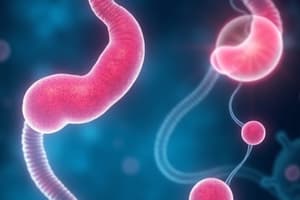Podcast
Questions and Answers
What is the net gain of ATP during the Embden Meyerhof Pathway?
What is the net gain of ATP during the Embden Meyerhof Pathway?
- 4
- 2 (correct)
- 6
- 0
Which molecule is formed when glucose-6-phosphate is diverted during the Hexose Monophosphate Shunt?
Which molecule is formed when glucose-6-phosphate is diverted during the Hexose Monophosphate Shunt?
- Glucagon
- Pyruvic acid
- Dextrin
- 6-phosphogluconate (correct)
What process describes the conversion of glucose to glycogen?
What process describes the conversion of glucose to glycogen?
- Gluconeogenesis
- Glycolysis
- Glycogenesis (correct)
- Glycogenolysis
Where does glycogenolysis primarily occur in the body?
Where does glycogenolysis primarily occur in the body?
What role does salivary amylase play in digestion?
What role does salivary amylase play in digestion?
Which substrates can be utilized in the Embden Meyerhof Pathway apart from glucose?
Which substrates can be utilized in the Embden Meyerhof Pathway apart from glucose?
What is the immediate effect of chewing rice on digestion?
What is the immediate effect of chewing rice on digestion?
When does the process of glycogenesis occur?
When does the process of glycogenesis occur?
What is the primary role of UDP Glucose in glycogen synthesis?
What is the primary role of UDP Glucose in glycogen synthesis?
Which of the following statements correctly describes the liver's capability regarding glucose?
Which of the following statements correctly describes the liver's capability regarding glucose?
Why are muscle cells unable to release glucose back into the bloodstream?
Why are muscle cells unable to release glucose back into the bloodstream?
What is produced when glycogen (n) reacts with UDP Glucose?
What is produced when glycogen (n) reacts with UDP Glucose?
What happens to glucose once it enters a muscle cell?
What happens to glucose once it enters a muscle cell?
What is the primary role of glucagon in glucose metabolism?
What is the primary role of glucagon in glucose metabolism?
Which of the following hormones is responsible for decreasing blood glucose levels?
Which of the following hormones is responsible for decreasing blood glucose levels?
How does insulin affect glycogen metabolism?
How does insulin affect glycogen metabolism?
What is the consequence of low ATP levels on neuron function?
What is the consequence of low ATP levels on neuron function?
What is the biochemical pathway called that converts glycogen into glucose?
What is the biochemical pathway called that converts glycogen into glucose?
Which process does somatostatin enhance?
Which process does somatostatin enhance?
What metabolic process is enhanced by glucagon?
What metabolic process is enhanced by glucagon?
Which pathway allows conversion of fatty acids to energy when glucose is low?
Which pathway allows conversion of fatty acids to energy when glucose is low?
What is a potential effect of prolonged lipolysis in patients with diabetes mellitus?
What is a potential effect of prolonged lipolysis in patients with diabetes mellitus?
What condition is characterized by hyperglycemia due to insulin deficiency?
What condition is characterized by hyperglycemia due to insulin deficiency?
Which mechanism leads to hypokalemia in patients experiencing acidosis?
Which mechanism leads to hypokalemia in patients experiencing acidosis?
Seizures in patients with diabetes mellitus can be triggered by which of the following?
Seizures in patients with diabetes mellitus can be triggered by which of the following?
What occurs in the body that disrupts glucose utilization in diabetes mellitus?
What occurs in the body that disrupts glucose utilization in diabetes mellitus?
What is a result of excessive urination in patients with diabetes mellitus?
What is a result of excessive urination in patients with diabetes mellitus?
What effect do excess ketones have on neurotransmitters in the CNS?
What effect do excess ketones have on neurotransmitters in the CNS?
Which of the following best describes hyperkalemia in diabetes mellitus?
Which of the following best describes hyperkalemia in diabetes mellitus?
What role does peristalsis play in the digestive process?
What role does peristalsis play in the digestive process?
During which condition does glycogenolysis primarily occur?
During which condition does glycogenolysis primarily occur?
What triggers the inactivation of salivary amylase in the stomach?
What triggers the inactivation of salivary amylase in the stomach?
What is the role of pancreatic amylase in digestion?
What is the role of pancreatic amylase in digestion?
Which enzymes are involved in breaking down disaccharides in the small intestine?
Which enzymes are involved in breaking down disaccharides in the small intestine?
What is gluconeogenesis primarily used for?
What is gluconeogenesis primarily used for?
What is the primary function of the villi in the small intestine?
What is the primary function of the villi in the small intestine?
How long can the body typically endure without eating while still having energy?
How long can the body typically endure without eating while still having energy?
Flashcards are hidden until you start studying
Study Notes
Pathways of Glucose Metabolism
-
Embden Meyerhof Pathway (Glycolysis):
- Converts glucose into two three-carbon molecules of pyruvic acid.
- Other substrates include glycerol, fatty acids, and ketones.
- ATP Usage:
- Used = 2
- Produced = 4
- Net gain = 2
-
Hexose Monophosphate Shunt:
- Redirects glucose-6-phosphate from glycolysis.
- Produces 6-phosphogluconate.
-
Glycogenesis:
- Initiates in the mouth with salivary amylase breaking down starch (polysaccharide).
- Glycogen forms only when energy needs are satisfied.
- Glucose is converted into glycogen, primarily in the liver, muscles, and other cells.
Digestion and Absorption
- Digestion begins in the mouth with salivary amylase.
- Salivary amylase acts on starch, producing dextrin and disaccharides.
- Stomach digestion involves hydrochloric acid, which inactivates salivary amylase.
- Pancreatic enzymes (amylase, bicarbonate) counteract stomach acid and assist in chemical digestion.
- Dextrins and disaccharides are further broken down at the brush border of the intestine into monosaccharides for absorption.
Glycogen Metabolism
-
Glycogenolysis:
- Breakdown of stored glycogen into glucose-1-phosphate.
-
Gluconeogenesis:
- Formation of glucose from non-carbohydrate sources (proteins and lipids).
- Occurs after glycogen stores are depleted during fasting.
-
Energy Sources During Fasting:
- First 24 hours relies on glycogen.
- Post 24 hours, alternatives such as fatty acids, glycerol, and ketones are utilized for glucose production.
Hormonal Regulation of Glucose Metabolism
-
Insulin:
- Promotes glycogenesis, glycolysis, and lipogenesis.
- Decreases glycogenolysis.
-
Glucagon:
- Stimulates glycogenolysis and gluconeogenesis.
- Converts fatty acids into ketones and proteins into amino acids for energy.
-
Somatostatin:
- Regulates insulin and glucagon balance.
Diabetes Mellitus (DM)
-
Class of metabolic disorders characterized by hyperglycemia due to:
- Insulin secretion defects or deficiencies.
- Insulin's role in reducing extracellular glucose concentrations is critical; muscle cells require insulin for glucose uptake.
- Hyperglycemia can lead to seizures and abnormal glucose utilization.
-
Electrolyte Imbalance:
- Occurs with prolonged hyperglycemia and polyuria, leading to potential acidosis and hyperkalemia.
Neurological Effects
- Low ATP levels impair sodium-potassium ATPase pump, affecting membrane potentials in nervous tissue.
- Hypoglycemia can trigger seizures due to altered neurotransmitter production caused by increased excitatory neurotransmitters.
Studying That Suits You
Use AI to generate personalized quizzes and flashcards to suit your learning preferences.




